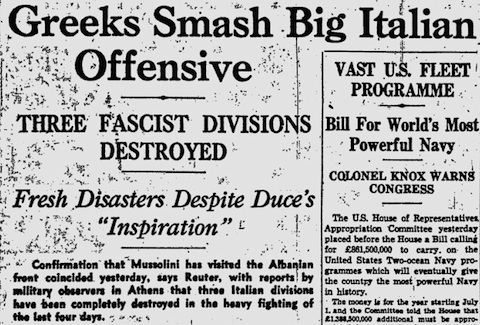
Lead item in today's Glasgow Herald is a report that 'a German U-boat is believed to have reached waters somewhere off the North Atlantic coast of America' (7). Slow news day? Not really; the real story is the way the war is creeping ever closer to America, and vice versa. The U-boat news was announced shortly after Churchill's speech in honour of the new US ambassador, John Winant. Churchill said that
Not only German U-boats but German battle cruisers have crossed to the American side of the Atlantic, and have already sunk some of our independently routed ships not sailing in convoy. They have sunk the ships as far west as the 42nd meridian longitude.
Even more, he played up the significance of Lease-and-Lend, describing it as 'an ocean-borne trumpet-call [which tells us] that we are no longer alone'. Churchill's conclusion:
You, Mr Ambassador, share our purposes. You will share our dangers. You will share our interests. You shall share our secrets. And the day will come when the British Empire and the United States will share together the solemn but splendid duties which are the crown of victory.
It sounds like US entry into the war is a mere formality. Of course, Churchill would very much like it to be.
Read the rest of this entry »









Comments
Brett Holman, JDK, Erik Lund, Chris Williams, Peter L. Griffiths, Brett Holman [...]
Brett Holman, Erik Lund
Brett Holman, Alan Allport, Erik Lund
Brett Holman, Airminded · Monday, 17 March 1941, Ian Evans, Airminded · Friday, 14 March 1941, Brett Holman, Tabitha
Brett Holman, Chris Williams, Christopher, Chris Williams, Christopher, Chris Williams [...]
Brett Holman, kikokun, Brett Holman, JJB, Brett Holman, name [...]
Airminded · Wednesday, 19 March 1941